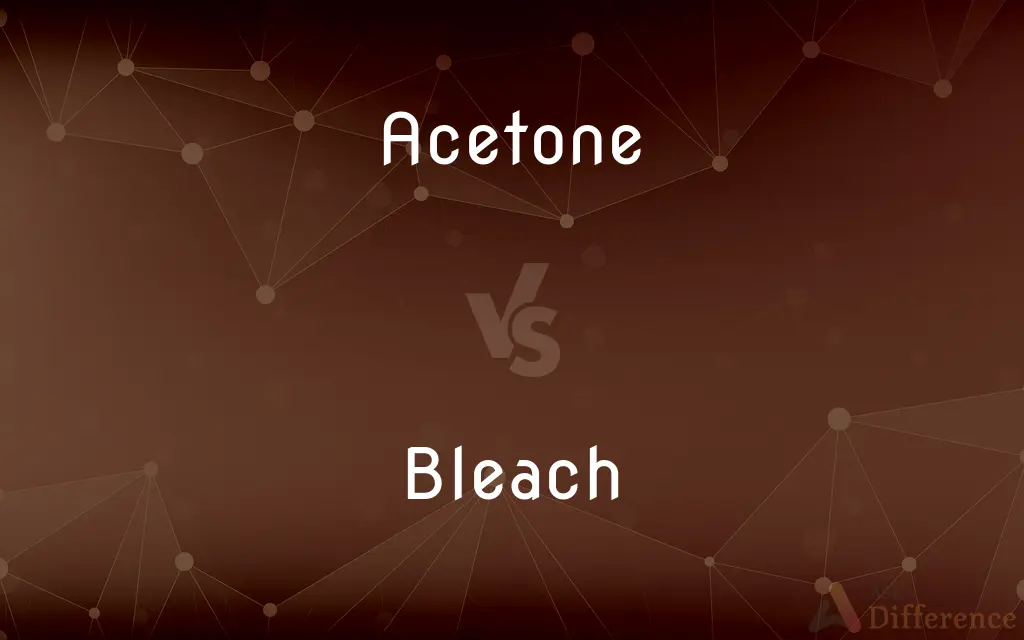Acetone vs. Bleach — What's the Difference?
By Tayyaba Rehman & Maham Liaqat — Updated on April 17, 2024
Acetone is a solvent used in industrial and cosmetic applications, primarily for cleaning and thinning, while bleach is a disinfectant used for sanitizing and whitening.

Difference Between Acetone and Bleach
Table of Contents
ADVERTISEMENT
Key Differences
Acetone is an organic compound known for its effectiveness as a solvent, particularly in the nail industry for removing nail polish. On the other hand, bleach, primarily composed of sodium hypochlorite, is used extensively as a disinfectant and for whitening clothes and surfaces.
While acetone is praised for its ability to dissolve plastics and synthetic fibers quickly, bleach is effective for killing bacteria, viruses, and mold, making it essential in cleaning and sanitization efforts, especially in healthcare and domestic environments.
Acetone occurs naturally in the environment and is also produced and disposed of in the human body as a metabolic byproduct. Whereas, bleach is synthesized and has significant environmental impacts if not handled and disposed of properly.
The volatility of acetone makes it a quick-drying substance, which is ideal for rapid cleaning processes, but it also poses inhalation risks and flammability concerns. Bleach, in contrast, is non-flammable but can release harmful fumes, especially when mixed with ammonia or other household cleaners.
In terms of health risks, acetone can cause irritation to the skin, eyes, and respiratory system upon exposure. Meanwhile, bleach can cause severe respiratory issues, skin burns, and eye damage if used improperly.
ADVERTISEMENT
Comparison Chart
Primary Use
Solvent, nail polish remover
Disinfectant, whitening agent
Common Applications
Cosmetic industry, cleaning synthetic materials
Sanitizing surfaces, whitening clothes
Environmental Impact
Naturally occurring, metabolic byproduct
Synthesized, can be environmentally harmful
Health Risks
Irritation to skin, eyes, respiratory system
Respiratory issues, skin burns, eye damage
Physical Properties
Volatile, flammable
Non-flammable, releases harmful fumes
Compare with Definitions
Acetone
Can cause irritation if inhaled or if it comes into contact with skin.
Prolonged exposure to acetone vapors can irritate the respiratory system.
Bleach
Potentially dangerous when mixed with other household chemicals.
Mixing bleach with ammonia can release toxic chloramine gas.
Acetone
A volatile, flammable solvent used widely in the cosmetic industry.
Acetone is commonly used to remove nail polish efficiently.
Bleach
Non-flammable but releases harmful fumes.
Using bleach in a non-ventilated area can lead to inhalation of dangerous fumes.
Acetone
Known for its effectiveness in dissolving plastics and synthetic fibers.
Acetone can dissolve plastic components in laboratory settings.
Bleach
Can be harmful to the environment if not disposed of properly.
Bleach can cause damage to aquatic life if it enters waterways.
Acetone
Used in various industrial applications beyond cosmetics.
Acetone is used as a solvent in paint thinners.
Bleach
Used commonly for whitening and removing stains from fabrics.
Adding bleach to laundry can help brighten white clothing.
Acetone
Occurs naturally and is produced in the human body.
Acetone is a byproduct of fat metabolism in the body.
Bleach
A disinfectant known for its ability to kill bacteria and viruses.
Bleach is used to disinfect surfaces in hospitals to prevent the spread of infections.
Acetone
Acetone, or propanone, is an organic compound with the formula (CH3)2CO. It is the simplest and smallest ketone. It is a colourless, highly volatile and flammable liquid with a characteristic pungent odour.
Bleach
Bleach is the generic name for any chemical product that is used industrially and domestically to remove color from a fabric or fiber or to clean or to remove stains in a process called bleaching. It often refers, specifically, to a dilute solution of sodium hypochlorite, also called "liquid bleach".
Acetone
A colorless, volatile, extremely flammable liquid ketone, C3H6O, widely used as an organic solvent. It is one of the ketone bodies that accumulate in the blood and urine when fat is being metabolized.
Bleach
To remove the color from, as by means of chemical agents or sunlight
Over time, the exposure to sunlight bleached the rug in front of the window.
Acetone
(organic compound) A colourless, volatile, flammable liquid ketone, (CH3)2CO, used as a solvent.
Bleach
To make white or colorless
Dawn bleached the mountains.
Acetone
A volatile liquid consisting of three parts of carbon, six of hydrogen, and one of oxygen; pyroacetic spirit, - obtained by the distillation of certain acetates, or by the destructive distillation of citric acid, starch, sugar, or gum, with quicklime.
Bleach
To whiten by causing the death or expulsion of algal symbionts from (coral).
Acetone
The simplest ketone; a highly inflammable liquid widely used as an organic solvent and as material for making plastics
Bleach
To act as or use a bleach.
Bleach
To become white as a result of the loss of algal symbionts, usually following an environmental stress such as increased water temperature. Used of coral.
Bleach
A chemical agent used for bleaching.
Bleach
The act of bleaching.
Bleach
The degree of bleaching obtained.
Bleach
(archaic) Pale; bleak.
Bleach
(transitive) To treat with bleach, especially so as to whiten (fabric, paper, etc.) or lighten (hair).
Bleach
(intransitive) To be whitened or lightened (by the sun, for example).
Bleach
To lose color due to stress-induced expulsion of symbiotic unicellular algae.
Once coral bleaching begins, corals tend to continue to bleach even if the stressor is removed.
Bleach
To make meaningless; to divest of meaning; to make empty.
Semantically bleached words that have become illocutionary particles
Bleach
(uncountable) A chemical, such as sodium hypochlorite or hydrogen peroxide, or a preparation of such a chemical, used for disinfecting or whitening.
Bleach
(countable) A variety of bleach.
Bleach
An act of bleaching; exposure to the sun.
Bleach
A disease of the skin.
Bleach
To make white, or whiter; to remove the color, or stains, from; to blanch; to whiten.
The destruction of the coloring matters attached to the bodies to be bleached is effected either by the action of the air and light, of chlorine, or of sulphurous acid.
Immortal liberty, whose look sublimeHath bleached the tyrant's cheek in every varying clime.
Bleach
To grow white or lose color; to whiten.
Bleach
The whiteness that results from removing the color from something;
A complete bleach usually requires several applications
Bleach
An agent that makes things white or colorless
Bleach
The act of whitening something by bleaching it (exposing it to sunlight or using a chemical bleaching agent)
Bleach
Remove color from;
The sun bleached the red shirt
Bleach
Make whiter or lighter;
Bleach the laundry
Common Curiosities
Is it safe to mix acetone with bleach?
No, mixing acetone with bleach can produce toxic fumes and is extremely hazardous.
How should bleach be stored?
Store bleach in a cool, dry place out of direct sunlight and away from children and pets.
What first aid measures should be taken for bleach exposure?
For bleach exposure, immediately rinse the affected area with water for at least 15 minutes and remove any contaminated clothing.
What is acetone used for?
Acetone is primarily used as a solvent and for removing nail polish.
What is bleach used for?
Bleach is used for disinfecting surfaces and whitening fabrics.
What are the safety precautions for using acetone?
Always use acetone in a well-ventilated area and wear protective gloves to avoid skin contact.
Are there environmental concerns associated with bleach?
Yes, improper disposal of bleach can harm the environment, particularly aquatic ecosystems.
How should acetone be stored?
Acetone should be stored in a cool, well-ventilated area away from open flames due to its flammability.
Can bleach and acetone remove the same types of stains?
No, their effectiveness differs based on the type of stain; bleach is better for organic stains, while acetone is suited for synthetic residues.
Can acetone be used as a disinfectant like bleach?
No, acetone does not have disinfecting properties like bleach.
What first aid measures should be taken for acetone exposure?
In case of skin contact with acetone, wash thoroughly with soap and water; if ingested, do not induce vomiting and seek medical attention.
What should I do if I inhale fumes from acetone or bleach?
If you inhale fumes from either chemical, move to fresh air immediately and seek medical attention if symptoms persist.
What are the safety precautions for using bleach?
When using bleach, ensure proper ventilation, avoid mixing with other chemicals, and wear protective gear to prevent burns.
Is acetone naturally occurring?
Yes, acetone can be found naturally in the environment and is a byproduct of human metabolism.
Can acetone and bleach be used in food production or processing?
Neither acetone nor bleach is suitable for use in food production or processing due to their harmful properties.
Share Your Discovery

Previous Comparison
Plating vs. Platting
Next Comparison
Fiscal vs. PhysicalAuthor Spotlight
Written by
Tayyaba RehmanTayyaba Rehman is a distinguished writer, currently serving as a primary contributor to askdifference.com. As a researcher in semantics and etymology, Tayyaba's passion for the complexity of languages and their distinctions has found a perfect home on the platform. Tayyaba delves into the intricacies of language, distinguishing between commonly confused words and phrases, thereby providing clarity for readers worldwide.
Co-written by
Maham Liaqat












































